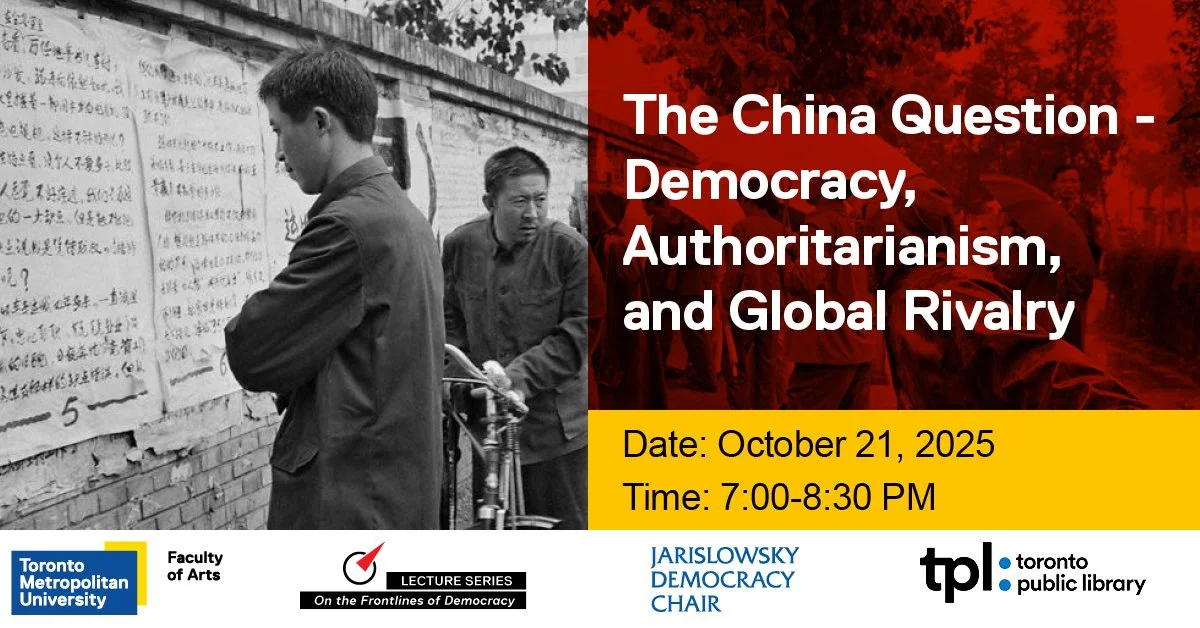The China Question - Democracy, Authoritarianism, and Global Rivalry
For centuries, Western scholars portrayed China either as a land of superior morality or as a formidable country of pagans that posed a global threat to Western values. The geopolitics of the last few decades facilitated more nuanced perspectives. Some believed global capitalism would support gradual democratization, others that liberal democracy was incompatible with Chinese governance. Either way, the “China Question” has underpinned policy approaches, academic analysis, and public understanding of China’s authoritarian model. Yet today, as economic pressures mount and US-China rivalry intensifies, this framework faces unprecedented scrutiny.
How are current economic crises—both within China and globally—testing the resilience of China’s authoritarian system? Why do assumptions about democracy’s incompatibility with China persist despite historical evidence of democratic movements and aspirations? What role does escalating US-China competition play in reinforcing or undermining China’s current political trajectory? How might internal contradictions within China’s model create openings for political transformation that conventional wisdom overlooks?
The renowned scholar Ho-Fung Hung explores these questions in conversation with Sanjay Ruparelia.
About the speaker:
Ho-fung Hung is the Henry M. and Elizabeth P. Wiesenfeld Professor in Political Economy at the Sociology Department and the Paul H Nitze School of Advanced International Studies of Johns Hopkins University. Dr. Hung is the author of Protest with Chinese Characteristics: Demonstrations, Riots, and Petitions in the Mid-Qing Dynasty, China and the Transformation of Global Capitalism, The China Boom: Why China Will not Rule the World, City on the Edge: Hong Kong Under Chinese Rule and Clash of Empires: From ‘Chimerica’ to the ‘New Cold War’. His articles have appeared in the American Journal of Sociology, American Sociological Review, Development and Change, Review of International Political Economy, Asian Survey, and elsewhere. Dr. Hung’s publications have been translated into seven different languages, and are recognized by awards from five different sections of the American Sociological Association, Social Science History Association, and the World Society Foundation of Switzerland. His analyses of the Chinese political economy and Hong Kong politics have been featured/cited in the New York Times, Financial Times, Wall Street Journal, Bloomberg News, BBC News, Die Presse (Austria), The Guardian, Folha de S. Paulo (Brazil), The Straits Times (Singapore), Xinhua Monthly (China), People’s Daily (China), among other publications. Dr. Hung received his BA from the Chinese University of Hong Kong, MA from SUNY-Binghamton, and PhD from Johns Hopkins. Prior to joining the Hopkins faculty, he taught at Indiana University-Bloomington.
About the discussant:
Sanjay Ruparelia is Professor of Politics and Public Administration at Toronto Metropolitan University, where he holds the Jarislowsky Democracy Chair, and a Senior Fellow of the Asia Pacific Foundation of Canada. His main publications include Divided We Govern: Coalition Politics in Modern India; The Indian Ideology, and Understanding India’s New Political Economy. His research has been supported by grants and fellowships from the Commonwealth Foundation, American Council of Learned Societies and Social Science and Humanities Research Council as well as Cambridge, Johns Hopkins, New School, Notre Dame, Princeton, Stellenbosch and Yale. Sanjay serves as a co-chair of Participedia, which studies democratic innovations globally, and on the editorial boards of Indian Politics and Policy and Pacific Affairs. He hosts On the Frontlines of Democracy, a monthly podcast and lecture series, and regularly contributes to media in Asia and North America, including the CBC, CTV, Channel News Asia, Globe and Mail, Hill Times, Hindustan Times, Indian Express, New York Times, The Hindu, The Walrus, Toronto Star and Washington Post. Sanjay previously taught at the New School for Social Research and Columbia University. He earned a B.A. in Political Science from McGill University, and a M.Phil in Sociology and Politics of Development and Ph.D. in Politics from the University of Cambridge.
About the series:
On the Frontlines of Democracy is a public lecture series to analyze the prospects of democracy in our world. In every region, democracies face serious challenges, old and new. Can we protect our constitutional democracies in an era of popular mistrust, severe partisanship and resurgent nationalism? Can they reduce inequalities of power, wealth and status, defend deep diversity and confront climate change in the new digital age? Can we develop innovative strategies to revitalize civic engagement and empower public institutions to renew the promise of collective self-rule? And what can Canada offer and learn to promote the prospects of democracy in our increasingly post-western world?

